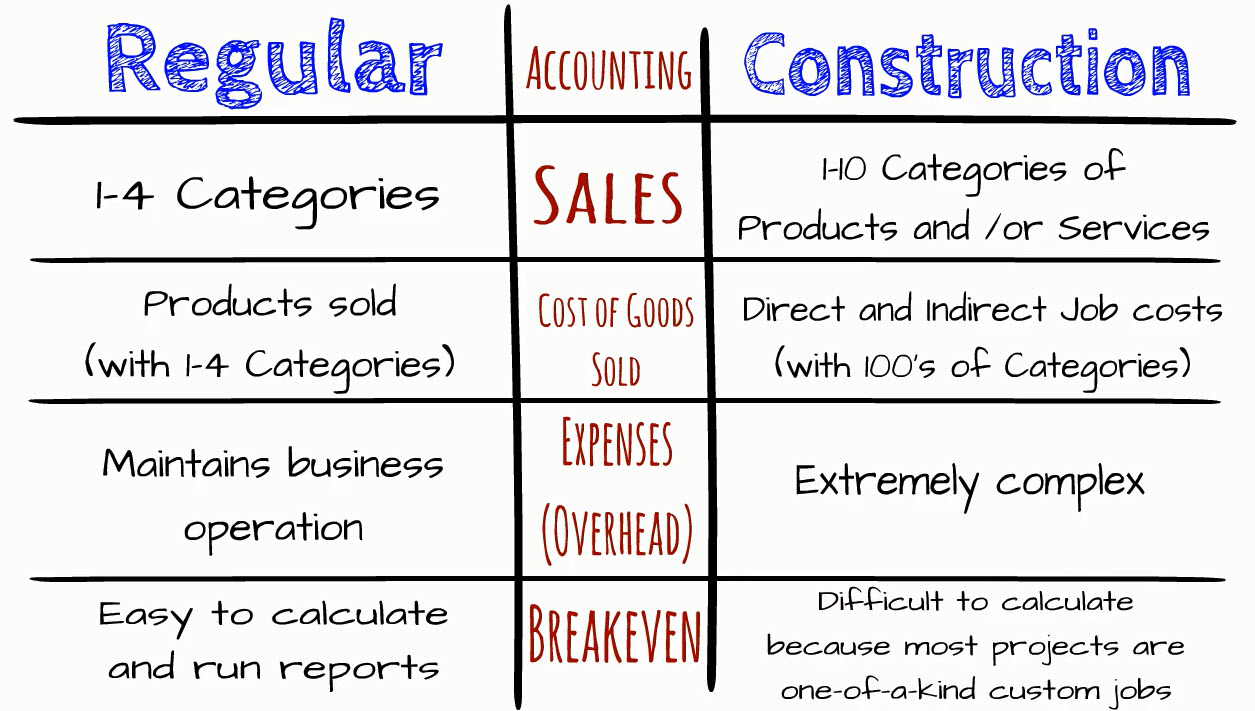Construction Accounting: Expert Solutions for Managing Project Budgets and Costs
Comprehending the Value of Building Accounting for Successful Project Monitoring

Function of Building Accountancy
Building and construction audit functions as the backbone of financial management in the construction sector, ensuring that projects are finished within budget and financial purposes are fulfilled. construction accounting. This specific bookkeeping approach addresses the one-of-a-kind challenges faced in building and construction tasks, including differing task periods, fluctuating costs, and several stakeholders
Among the primary roles of building and construction accounting is to supply accurate expense evaluation and tracking throughout the task lifecycle. This facilitates educated decision-making, allowing project managers to adjust resources and timelines efficiently. Additionally, construction bookkeeping improves capital monitoring by keeping track of accounts payable and receivable, hence making certain that funds are offered for prompt settlements to providers and subcontractors.
Moreover, building and construction bookkeeping help in compliance with industry laws and coverage requirements. It outfits job supervisors with the needed financial data to prepare detailed monetary statements, which are crucial for audits and economic testimonials. By keeping clear documents, construction accounting promotes openness and liability, vital elements in building trust fund among stakeholders. Ultimately, the role of construction accounting extends beyond plain monetary monitoring; it is essential to tactical planning and functional effectiveness, driving the success of building and construction jobs in an affordable landscape.
Key Elements of Building Accounting

Budgeting develops a monetary framework that overviews task implementation, allowing managers to allocate resources effectively and anticipate potential financial challenges. Exact price monitoring is crucial for surveillance expenses in real-time, assisting to determine variances between predicted and real costs. This allows prompt changes to keep the task on budget.
Furthermore, monetary reporting offers stakeholders with a clear photo of the task's financial health. Normal records, such as earnings and loss statements and cash money circulation analyses, facilitate notified decision-making and enhance transparency among all celebrations involved.
Furthermore, compliance with sector policies and bookkeeping standards is critical. This guarantees that monetary practices are not just efficient however additionally authorized, guarding the company against legal repercussions. By integrating these vital elements, building bookkeeping fosters an organized technique to handling funds, inevitably adding to the successful conclusion of construction tasks.
Benefits for Project Managers
Leveraging effective building audit methods provides project supervisors with a wide variety of benefits that improve both operational efficiency and financial oversight. One significant advantage is improved budget plan monitoring. Accurate tracking of costs and profits permits task supervisors to keep track of economic performance in genuine time, guaranteeing projects stay within budget plan and promoting prompt adjustments when essential.
Moreover, building bookkeeping improves capital management, allowing task supervisors to optimize and expect economic requirements resource allowance. By understanding cash money inflows and outflows, they can better manage settlements to subcontractors, distributors, and workers, thus avoiding expensive hold-ups.
In addition, durable accounting systems offer detailed reporting capabilities. Project supervisors can produce reports that offer understandings right into job productivity, expense variations, and source use. This data-driven method promotes educated decision-making, enabling supervisors to identify potential problems proactively and execute corrective steps.
Finally, adherence to construction bookkeeping criteria guarantees compliance with regulative and legal needs, decreasing the risk of disagreements or fines. On the whole, efficient building accountancy gears up task managers with the tools essential to drive task success, improve stakeholder you could check here confidence, and advertise long-lasting business growth.
Typical Challenges in Building Accountancy
Numerous job supervisors experience substantial challenges in construction accounting that can prevent task success. One of the main obstacles is the complexity of tracking multiple task websites, each with distinct spending plans, timelines, and source appropriations. This requires thorough interest to detail, which can be overwhelming without a robust accounting system in location.
Furthermore, fluctuating product prices and labor rates can make complex budget monitoring, making exact projecting hard. Task managers frequently have a hard time to resolve these expenses with real expenses, bring about possible monetary discrepancies.
Additionally, building and construction bookkeeping includes compliance with various policies, consisting of tax responsibilities and labor laws. Browsing these rules can be overwhelming, specifically for managers that might not have a solid bookkeeping history.
Another significant obstacle is taking care of cash money circulation, which is crucial in the building sector. Delays in invoicing, repayments from customers, or unforeseen job adjustments can create money flow scarcities, jeopardizing the job's progress.
Last but not least, efficient communication between task supervisors, accountants, and area groups is important. Misunderstandings can lead to inaccurate financial reporting, even more making complex task monitoring efforts. Addressing these challenges proactively is important for successful construction bookkeeping.

Finest Practices for Effective Bookkeeping
While navigating the complexities of building and construction bookkeeping can be difficult, embracing best practices can considerably improve economic management and task success. One basic method is maintaining timely and precise documents. Implementing robust accounting software tailored to building and construction jobs can enhance data entrance, invoicing, and coverage, conserving and minimizing errors time.
In addition, developing a clear budget and routine tracking against this budget are essential. Employing a system of periodic monetary reviews permits project supervisors to identify differences early, facilitating timely decision-making. It is likewise important to separate job prices into indirect and direct classifications, enabling clearer insights into earnings.
Another best technique involves promoting open communication among all stakeholders. Normal updates and collective conversations regarding monetary status can make sure every person is aligned and educated. Training personnel in construction-specific accountancy concepts further enhances competency and accuracy.
Finally, making sure conformity with relevant accounting requirements and guidelines is non-negotiable. Normal audits and interior reviews add to transparency and accountability, building depend on with stakeholders and clients. By focusing on these finest methods, building and construction firms can maximize their bookkeeping procedures, inevitably driving task success and monetary stability.
Verdict
To conclude, construction bookkeeping plays a crucial function in guaranteeing successful project monitoring by facilitating accurate economic oversight and improving decision-making. By integrating vital elements such as cost evaluation, cash money circulation management, and compliance, task supervisors can navigate typical obstacles and leverage ideal techniques for efficient accountancy. Inevitably, a robust building and construction accountancy structure not just safeguards budget honesty but also adds to the overall economic wellness of building tasks, promoting lasting success within the industry.
By incorporating these key parts, construction bookkeeping promotes a structured technique to managing financial resources, ultimately adding to my link the successful completion of building tasks.
Precise monitoring of profits and expenditures permits job managers to keep track of monetary efficiency read the full info here in actual time, making certain jobs continue to be within budget plan and assisting in timely changes when essential.
Project supervisors can create reports that provide understandings right into job productivity, cost variations, and resource application.Lots of task managers encounter substantial obstacles in building accounting that can hinder task success. construction accounting. Ultimately, a durable building and construction bookkeeping framework not only safeguards spending plan stability but likewise contributes to the overall economic health and wellness of construction jobs, fostering lasting success within the industry